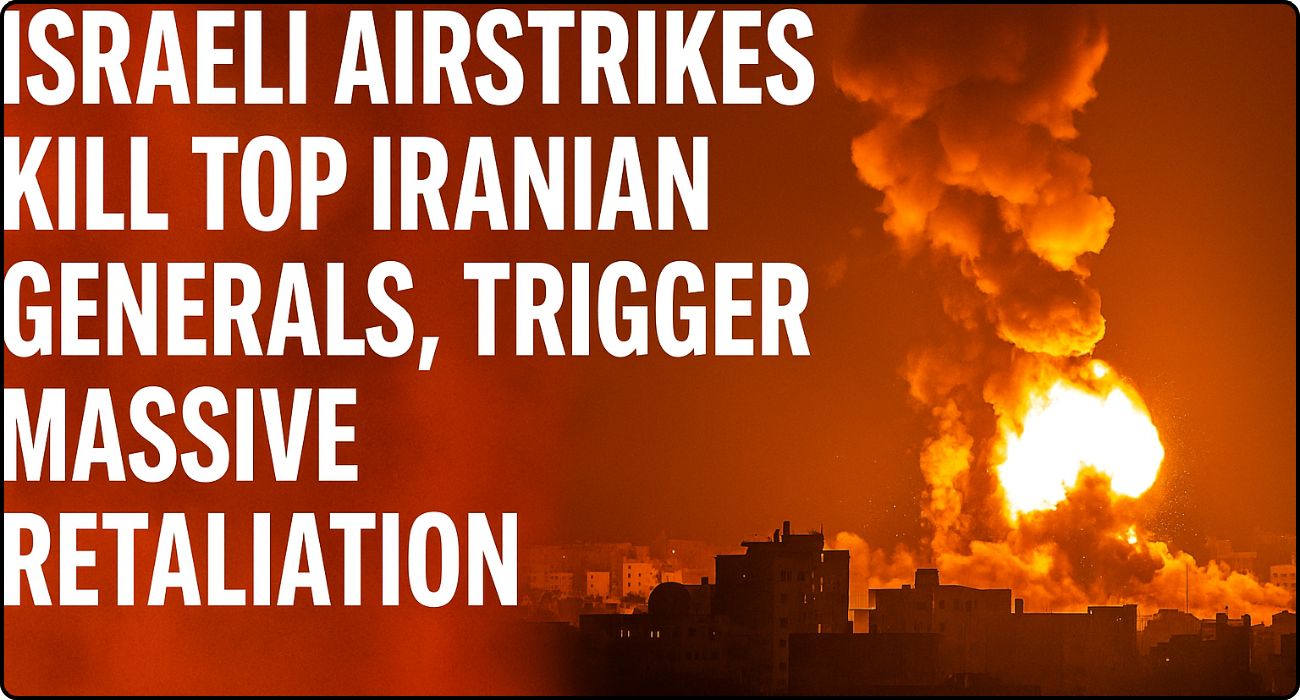In a major escalation, Israeli airstrikes kill Iranian generals, including IRGC commanders and nuclear scientists. Iran retaliates with drone attacks. Full timeline and international response here.
Israeli Airstrikes Kill Iranian Generals: Operation Rising Lion Ignites Middle East Crisis
In a sudden and unprecedented move, Israel has launched a wave of airstrikes across Iran, targeting nuclear facilities, key military infrastructure, and top-ranking commanders of the Islamic Revolutionary Guard Corps (IRGC). The operation, dubbed “Operation Rising Lion,” marks one of the most aggressive Israeli military actions in years and has already led to serious retaliation from Iran.
THe Israeli Airstrikes Kill Iranian Generals, which took place late on June 12, 2025, and continued into the early hours of June 13, were aimed at curbing what Israeli officials claim is an “imminent threat” from Iran’s accelerating nuclear weapons program. The bold military campaign has significantly escalated tensions between the two regional powers, risking a full-scale war in the Middle East.
Israeli Airstrikes Kill Iranian Generals : Top Iranian Military Leaders Assassinated in Airstrikes
According to multiple international sources, including Reuters and NY Post, the Israeli Airstrikes Kill Iranian Generals successfully eliminated several high-ranking Iranian military officials. Among those killed were:
-
Major General Hossein Salami – Commander-in-Chief of the IRGC.
-
Major General Mohammad Bagheri – Chief of Staff of the Iranian Armed Forces.
-
Major General Gholam Ali Rashid – Head of the Khatam al-Anbiya Central Command.
-
Fereydoun Abbasi-Davani – Notable nuclear scientist and former head of Iran’s Atomic Energy Organization.
-
Mohammad Mehdi Tehranchi – A senior nuclear physicist and influential academic.
These strikes were primarily carried out in Tehran, Natanz, and Khondab — locations known for being central to Iran’s nuclear operations and military headquarters.
Witnesses in Tehran reported explosions that shook the city, with fires breaking out near the Tajrish district. Iranian state media also confirmed at least 50 civilian injuries, many of whom were women and children. Video footage shared online shows ambulances rushing through the capital amid blaring sirens and widespread panic.
Also Read: Ahmedabad Plane Crash-London-Bound Air India Flight Crashes During Take-Off
Israel’s Motivation Behind the Strikes
Israeli officials have not formally claimed responsibility for the strikes, but senior defense figures have indirectly confirmed Israel’s role in what they described as a “preemptive move to neutralize an existential threat.”
In recent weeks, intelligence reports had emerged indicating that Iran was fast-tracking its uranium enrichment program. The Israeli government reportedly viewed this as a red line, prompting the decision to act militarily before the situation worsened.
“This was not a war of choice,” said one unnamed Israeli security official. “If we did not act now, there might not be a next generation to protect.”
Iran’s Swift and Forceful Response
Within hours of the Israeli bombardment, Iran launched a barrage of retaliatory drone strikes. The Islamic Republic deployed over 100 UAVs aimed at strategic locations in Israel. While many were intercepted by Israel’s Iron Dome defense system, some managed to reach their targets, causing minor structural damage in southern Israel and triggering nationwide air raid sirens.
Iran’s Supreme Leader Ayatollah Ali Khamenei issued a stern warning following the attack, declaring that Israel would “face the full wrath of the Iranian nation.” He promised “a war that will not end on your terms.”
An IRGC spokesperson also stated that both Israel and the United States would “pay a very heavy price for this aggression.” Though the U.S. denied any involvement in the operation, American military bases in Iraq, Syria, and the Persian Gulf have now been placed on high alert.
International Reactions and Diplomatic Fallout
The global reaction to this sudden conflict has been swift and deeply concerned. The United Nations, European Union, Russia, and China have all issued urgent calls for de-escalation.
UN Secretary-General Antonio Guterres said, “The world cannot afford another regional war. I urge both nations to show restraint and return to the path of diplomacy.”
The United States, while stressing it had no part in the Israeli action, has moved to secure its personnel in the region. U.S. embassies in Baghdad, Dubai, and Beirut have issued shelter-in-place orders for staff and American citizens.
Meanwhile, oil prices have surged over 6% in global markets amid fears that escalating military tensions could disrupt crude supplies from the Persian Gulf. Energy analysts have warned that if the conflict spreads, it could trigger a significant supply chain crisis and a new energy shock.
Regional Tensions and Proxy Conflicts
The Israel-Iran confrontation also has the potential to ignite various proxy conflicts across the Middle East. Hezbollah in Lebanon and Iran-backed militias in Iraq and Syria have issued statements of solidarity with Tehran. Security experts fear that these groups could open new fronts against Israeli or Western interests in the region.
At the same time, Gulf nations such as Saudi Arabia and the UAE, which have historically had strained ties with Iran, are closely watching developments. These countries are preparing for possible security fallout and have reportedly begun secretive talks with both Washington and Tel Aviv.
For More Details, Click Here!
Nuclear Negotiations at Risk
The timing of these events is particularly sensitive as Iran was expected to engage in renewed negotiations over its nuclear program with the International Atomic Energy Agency (IAEA). The targeted killing of top nuclear scientists and damage to critical enrichment facilities may derail diplomatic efforts for the foreseeable future.
“This effectively buries the diplomatic track,” said a European diplomat based in Vienna. “It will take years to rebuild trust — if it’s even possible anymore.”
What Comes Next?
While Israel has not announced plans for additional strikes, Iranian state media has reported that the country is now on “maximum military alert.” Satellite images show increased activity at Iranian air bases and missile sites.
There is a real fear that the coming days could see a wider war break out — involving cyberattacks, missile exchanges, and attacks by proxy militias. Both countries appear to be preparing for an extended period of confrontation.
